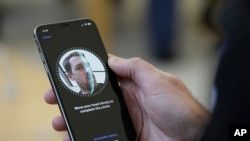ນັກສືບສວນສອບສວນທ່ານນຶ່ງ ຂອງອົງການສະຫະປະຊາຊາດກ່າວວ່າ ຄວາມເຕີບ
ໃຫຍ່ຂອງອຸດສາຫະກຳການສອດແນມເອກກະຊົນແລະການເອົາບຸກ ຄົນເປັນເປົ້າ
ໝາຍຂອງເທັກໂນໂລຈີການສິ້ງຊອມດ້ວຍດີຈີຕອລ ແມ່ນເປັນການ ຂົ່ມຂູ່ຕໍ່ອິດສະ
ຫລະພາບ ດ້ານການສະແດງອອກ ແລະເຮັດໃຫ້ຊີວິດຂອງສ່ວນ ບຸກຄົນ ຕົກຢູ່ໃນ
ຄວາມສ່ຽງ. ຜູ້ລາຍງານພິເສດຂອງສະຫະປະຊາຊາດກ່ຽວກັບ ເລື້ອງການສະແດງ
ຄວາມຄິດຄວາມເຫັນ ແລະຄວາມຮູ້ສຶກອອກມາ ເດວິດ ເຄ ໄດ້ສົ່ງລາຍງານເລື້ອງນີ້ ໄປໃຫ້ສະພາສິດທິມະນຸດຂອງສະຫະປະຊາຊາດ ໃນ ວັນພຸດແລ້ວ ຊຶ່ງ Lisa
Schlein ມີລາຍງານກ່ຽວ ກັບເລື້ອງນີ້ ຈາກເຈນີວາ ດັ່ງສາລີຈະນຳ ລາຍລະອຽດ ມາ
ສະເໜີທ່ານ ໃນອັນດັບຕໍ່ໄປ.
ນັກສອບສວນຂອງສະຫະປະຊາຊາດ ເດວິດ ເຄ ບໍ່ໄດ້ປະນາມການເຄື່ອນ ໄຫວດ້ານ
ການສອດແນມທຸກຢ່າງ. ເພິ່ນຮັບຮູ້ວ່າລັດຖະບານຂອງປະເທດຕ່າງໆ ຍ່ອມມີເຫດ
ຜົນ ແລະຄວາມຈຳເປັນ ທີ່ຈະຕ້ອງໄດ້ໃຊ້ສິ່ງສິ້ງຊອມທາງເທັກໂນໂລຈີ ເພື່ອຮັບມືກັບ
ກິດຈະກຳຂອງອາດຊະຍາກອນ ເຊັ່ນພວກກໍ່ການຮ້າຍເປັນຕົ້ນ.
ເພິ່ນກ່າວວ່າ ລັດຖະບານຄວນສາມາດໄດ້ຮັບແລະໃຊ້ເທັກໂນໂລຈີເພື່ອປ້ອງກັນ ພົນ
ລະເມືອງຂອງຕົນ.
ແຕ່ເພິ່ນກໍກ່າວວ່າ ເພິ່ນພົບເຫັນວ່າ ການໂອນເທັກໂນໂລຈີດີຈີຕອລສອດແນມ ສ່ວນ
ຕົວໄຫ້ລັດຖະບານທີ່ໃຊ້ມັນເປັນເຄື່ອງມືເພື່ອທຳການບີບບີ້ແມ່ນເປັນຄວາມ ກັງວົນ
ຫລາຍ ດັ່ງເພິ່ນໄດ້ເວົ້າວ່າ:
“ພວກເຮົາໄດ້ຮູ້ເຫັນດ້ວຍຕາ ການສອດແນມທີ່ເປັນອິດສະຫລະ ສຳລັບທຸກຄົນ ບ່ອນ
ທີ່ທາງລັດແລະອຸດສາຫະກຳຮ່ວມມືກັນ ໃນການເຜີຍແຜ່ເທັກໂນໂລຈີ ທີ່ ເປັນອັນຕະ
ລາຍໃນທັນທີແລະເປັນປະຈຳ ຕໍ່ບຸກຄົນຕ່າງໆໃນທົ່ວໂລກ ຊຶ່ງຕາມ ປົກກະຕິ ແມ່ນ
ຂ້າມຊາຍແດນ ທີ່ເປັນອັນຕະລາຍແກ່ບຸກຄົນແລະຕໍ່ອົງການ ທີ່ ຈຳເປັນ ສຳລັບການ
ດຳລົງຊີວິດທີ່ເປັນປະຊາທິປະໄຕເຊັ່ນພວກນັກຂ່າວ ພວກ ປົກປ້ອງ ພວກຝ່າຍຄ້ານ ພວກທະນາຍຄວາມ ແລະອື່ນໆ.”
ໃນລາຍງານຂອງເພິ່ນ ທ່ານ ເຄ ໄດ້ເວົ້າເຖິງຕົວຢ່າງຫລາຍອັນສູ່ຟັງ. ໃນກໍລະ ນີນຶ່ງກໍ
ແມ່ນ ລັດຖະບານ ເອທິໂອເປຍ ໄດ້ຖືກກ່າວຫາວ່າ ທຳການສອດແນມ ຊາວເອທີໂອ
ເປຍຄົນນຶ່ງທີ່ຢູ່ໃນ ສະຫະລັດ. ເທັກໂນໂລຈີດັ່ງກ່າວໄດ້ສ້າງບັນຫາ ໃຫ້ແກ່ຄອມພິວເຕີ
ຂອງລາວ ໂດຍເຄື່ອງທຳລາຍ ທີ່ເຮັດຈາກບໍລິສັດເຢຍຣະມັນ ແລະອັງກິດ. ໂປຣແກຣມ
ດັ່ງກ່າວ ໄດ້ອັດເອົາອີເມລຂອງລາວ ການໂອ້ລົມຜ່ານ ທາງວີດິໂອແລະການເຄາະແປ້ນ
ອັກສອນໃນແຕ່ລະເທື່ອ ແລ້ວຂໍ້ມູນຕ່າງໆກໍໄດ້ ຖືກສົ່ງໄປບ່ອນຮັບຂໍ້ມູນໃນເອທິໂອເປຍ.
ໃນອີກກໍລະນີນຶ່ງ ທ່ານ ເຄ ກ່າວວ່າ ການລາຍງານທີ່ໜ້າເຊື່ອຖືໄດ້ສະເໜີແນະ ໃຫ້ເຫັນ
ວ່າ ລັດຖະບານຈີນໄດ້ໃຊ້ເທັກໂນໂລຈີຈື່ຮູບໜ້າຕາແລະກ້ອງຖ່າຍສອດ ແນມ ເພື່ອ
ສອດຊ່ອງເບິ່ງພວກຊົນເຜົ່າວີເກີ້ ທີ່ອີງໃສ່ ຮູບໃບໜ້າຂອງພວກເຂົາ ເຈົ້າ. ລາຍງານນັ້ນ
ເວົ້າວ່າ ລັດຖະບານຈະບັນທຶກໄວ້ ການເຂົ້າອອກຂອງພວກ ເຂົາເຈົ້າ ເພື່ອຄົ້ນຄວ້າ
ແລະທົບທວນຄືນເບິ່ງ. ເພິ່ນກ່າວວ່າ ເທັກໂນໂລຈີບາງອັນແມ່ນເຮັດຂຶ້ນໂດຍບໍລິສັດເອ
ກະຊົນຈີນ.
ທ່ານ ເຄ ກ່າວວ່າ ເທັກໂນໂລຈີດັ່ງກ່າວ ໄດ້ຂະຫຍາຍໄປທົ່ວໂລກ ໂດຍບໍ່ມີ ການຄວບ
ຄຸມ. ເພິ່ນກ່າວວ່າ ອຸດສາຫະກຳສອດແນມເອກະຊົນ ພາກັນປະຕິ ບັດງານ ຢູ່ໃນເງົາ
ມືດ ພາກັນພັດທະນາ ແລະ ນຳອອກສູ່ຕະຫລາດ ເທັກໂນ ໂລຈີຂອງເຂົາເຈົ້າຢູ່ໃນບ່ອນ
ເລິກລັບທີ່ສຸດ. ເພິ່ນໄດ້ໃຫ້ຂໍ້ສັງເກດວ່າ ການຄ້າ ໄດ້ຮັບການຊຸກຍູ້ ໂດຍຄວາມກະຫາຍ
ຜົນກຳໄລ.
ເພິ່ນໄດ້ເຕືອນວ່າ ຖ້າລັດຖະບານບໍ່ຄວບຄຸມຢ່າງເຄັ່ງຄັດ ການສົ່ງອອກ ຫລື ໂອນເທັກ
ໂນໂລຈີສອດແນມ ທີ່ເປັນເປົ້າໝາຍນີ້ແລ້ວ ມັນກໍຈະປ່ອຍໃຫ້ມີການ ຄ້າຂາຍທີ່ບໍ່ຖືກ
ຕ້ອງຕາມກົດໝາຍທັງມີອັນຕະລາຍເກີດຂຶ້ນຢ່າງໃຫຍ່ ຊຶ່ງທ່ານ ເຄ ກ່າວຕື່ມວ່າ:
“ໄດ້ມີການຮັບຮູ້ກັນທົ່ວໄປ ວ່າການສອດແນມແບບດີຈິຕອລ ໂດຍສະເພາະເວ ລາດຳ
ເນີນໄປ ໂດຍບໍ່ມີການຄວບຄຸມແລະສອດຊ່ອງເບິ່ງພາຍໃຕ້ກົດໝາຍລັບ ແລະນະໂຍ
ບາຍຕ່າງໆໂດຍບໍ່ມີການເປີດເຜີຍການຊື້ຫລືການໃຊ້ ມັນກໍຈະເປັນ ການຂົ່ມຂູ່ຕໍ່ເສລີ
ພາບໃນການສະແດງອອກ.
ທ່ານ ເຄ ພວມຮຽກຮ້ອງ ໃຫ້ມີການເອົາມາດຕະການທັນທີ ຕໍ່ການຊື້ຂາຍ ການໂອນ
ແລະການໃຊ້ຢູ່ໃນທົ່ວໂລກ ເຄື່ອງມືຂອງອຸດສາຫະກຳສອດແນມ ເອກະຊົນ. ເພິ່ນເວົ້າ
ວ່າ ເພິ່ນບໍ່ໄດຮຽກຮ້ອງໃຫ້ເກືອດຫ້າມ ຫລືຍຸຕິການ ສອດແນມທັງໝົດຢ່າງຖາວອນ.
ແຕ່ເພິ່ນກໍກ່າວວ່າ ການຮັກສາຄວາມປອດໄພຢ່າງເອົາຈິງເອົາຈັງ ເພື່ອປ້ອງກັນ ສິດ
ທິມະນຸດຈະຕ້ອງມີຂຶ້ນ ເພື່ອໃຫ້ແນ່ໃຈວ່າ ເຄື່ອງມືຂອງການສອດແນມດ້ວຍ ດີຈິຕອລ ຈະໃຊ້ໄປໃນທາງທີ່ຖືກຕ້ອງ ກ່ອນທຸລະກິດໃນເທັກໂນໂລຈີດ້ານນີ້ຈະ ໄດ້ຮັບອະນຸຍາດ
ໃຫ້ນຳອອກມາໃຊ້.
A United Nations investigator says the rise of the private surveillance industry and the targeting of individuals by digital surveillance technology is undermining freedom of expression and putting the lives of many individuals at risk. The U.N. special rapporteur on freedom of opinion and expression, David Kaye, submitted his report to the U.N. Human Rights Council on Wednesday.
U.N. investigator David Kaye does not condemn all surveillance activities. He recognizes that governments may have a valid and critical need to use surveillance technology in to confront criminal activity, such as terrorism.
He says governments should be able to acquire and use the technology to protect their citizens.
But he says he finds the transfer of private digital surveillance technology to governments that use it as a tool of repression very worrisome.
‘We are witnessing a surveillance free for all, in which states and industry are essentially collaborating in the spread of technology that is causing immediate and regular harm to individuals worldwide, often across borders harming individuals and organizations that are essential to democratic life—journalists, defenders, opposition figures, lawyers, and others,” Kaye said.
In his report, Kaye cites numerous examples. In one case, Ethiopia's government allegedly spied on an Ethiopian-born man in the U.S. The technology infected his computer with malware marketed by a German and British company. The program recorded his emails, Internet video calls and keystrokes. The data was then sent back to servers in Ethiopia.
In another case, Kaye says credible reporting suggests the Chinese government used facial recognition technology and surveillance cameras to look for ethnic Uighurs based on their appearance. The government reportedly keeps records of their comings and goings for search and review. He says some of the technology was produced by private Chinese companies.
Kaye says the technologies are spreading globally without control. He says the private surveillance industry operates in the shadows, developing and marketing the technologies in highly secretive settings. He notes that trade is driven by a thirst for profits.
He warns the failure of states to impose constraints on the export or other transfer of targeted surveillance technology allows the illegitimate, dangerous trade to flourish.
“There is wide recognition that digital surveillance, particularly when conducted in the absence of legal constraint and oversight under cover of secret laws and policies without disclosure of purchase or use, is a threat to freedom of expression,” said Kaye.
Kaye is calling for an immediate moratorium on the global sale, transfer and use of the tools of the private surveillance industry. He says he is not calling for a permanent ban or an end to all surveillance.
But he says rigorous human rights safeguards must be put in place to assure digital surveillance tools are being used in legitimate ways before business in the technology is allowed to go ahead.





